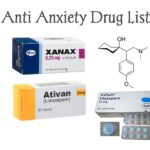Drugs That Control Anxiety And Severe Disturbances Of Behavior

Anxiety refers to a mental health condition characterized by excessive and persistent worry, fear, or unease about everyday situations. It is a normal human emotion, but when it becomes excessive and interferes with daily life, it can be considered an anxiety disorder. Common symptoms of anxiety include restlessness, irritability, difficulty concentrating, muscle tension, and sleep disturbances.
Severe disturbances of behavior can refer to a range of behaviors that significantly disrupt normal functioning and may be indicative of a mental health condition or a neurological disorder. These disturbances can manifest in various ways, such as aggressive outbursts, self-harm, impulsivity, disorganized behavior, or difficulties in social interactions.
It’s important to note that anxiety and severe disturbances of behavior can occur independently or in conjunction with each other. Anxiety can sometimes contribute to or exacerbate disruptive behaviors, and addressing the underlying anxiety may help manage these disturbances.
Diagnosing Anxiety And Severe Disturbances Of Behavior
Diagnosing anxiety and severe disturbances of behavior typically involves a comprehensive evaluation conducted by a qualified mental health professional. Here is an overview of the diagnostic process:
1. Initial Assessment: The mental health professional will conduct an initial interview to gather information about your symptoms, medical history, family history, and any significant life events or stressors. They may also use standardized questionnaires or assessment tools to gather more specific information about your symptoms and their impact on your daily life.
2. Differential Diagnosis: The mental health professional will consider various factors and rule out other possible causes of your symptoms, such as medical conditions or substance abuse. They will assess if your symptoms align with specific anxiety disorders (e.g., generalized anxiety disorder, panic disorder, social anxiety disorder) or other mental health conditions that may present with severe disturbances of behavior.
3. Diagnostic Criteria: The mental health professional will refer to the Diagnostic and Statistical Manual of Mental Disorders (DSM-5) or another relevant diagnostic manual to determine if your symptoms meet the criteria for a specific disorder. They will assess the intensity, frequency, duration, and impact of your symptoms to make an accurate diagnosis.
4. Collaboration and Observation: The mental health professional may collaborate with other healthcare providers, such as physicians or neurologists, to rule out any underlying medical conditions that could contribute to your symptoms. They may also observe your behavior in different contexts to gather additional information.
5. Feedback and Treatment Planning: Once a diagnosis is made, the mental health professional will provide you with feedback on their findings and discuss treatment options. Treatment may involve a combination of therapy, medication, and other supportive interventions tailored to your specific needs.
Drugs That Control Anxiety And Severe Disturbances Of Behavior
There are various medications available that can help in managing anxiety and severe disturbances of behavior. It’s important to note that medication should be prescribed and monitored by a qualified healthcare professional, such as a psychiatrist, who can assess your specific symptoms and needs. Here are some commonly used medications:
1. Antidepressants: Selective serotonin reuptake inhibitors (SSRIs) and serotonin-norepinephrine reuptake inhibitors (SNRIs) are commonly prescribed for anxiety disorders. Examples include fluoxetine, sertraline, escitalopram, venlafaxine, and duloxetine. These medications can help regulate serotonin levels in the brain, improving mood and reducing anxiety symptoms.
2. Benzodiazepines: Benzodiazepines are fast-acting medications that can provide short-term relief for severe anxiety symptoms or acute episodes. They work by enhancing the effects of a neurotransmitter called GABA, which helps to reduce anxiety. Examples include alprazolam, diazepam, and lorazepam. However, benzodiazepines are typically prescribed for short-term use due to the risk of dependence and other side effects.
3. Antipsychotics: Atypical antipsychotics, such as quetiapine or risperidone, may be prescribed for severe disturbances of behavior, especially in cases where there is aggression, impulsivity, or psychosis. These medications help to stabilize mood and reduce disruptive behaviors.
4. Mood Stabilizers: Mood stabilizers, like lithium or valproate, are primarily used in the treatment of bipolar disorder, which can involve both anxiety and severe disturbances of behavior. They help to regulate mood and prevent mood swings.
It’s important to understand that medication is not always the first line of treatment and is often used in conjunction with therapy or other interventions. The choice of medication and dosage will depend on various factors, including the specific diagnosis, individual response, and potential side effects. Only a qualified healthcare professional can determine the most appropriate medication for your situation.
It’s crucial to have a thorough discussion with your healthcare provider to weigh the benefits and risks of medication, discuss potential side effects, and address any concerns you may have. They will monitor your progress and make any necessary adjustments to the treatment plan.
Non-Medicinal Ways To Control Anxiety And Severe Disturbances Of Behavior
There are several non-medicinal strategies and lifestyle changes that can help in managing anxiety and severe disturbances of behavior. While these techniques may not be a substitute for professional help, they can complement treatment and promote overall well-being. Here are some non-medicinal approaches:
1. Therapy: Psychotherapy, such as cognitive-behavioral therapy (CBT), can be highly effective in treating anxiety and behavior disturbances. It helps you identify and challenge negative thought patterns, develop healthy coping mechanisms, and learn new behavioral skills. Therapy can provide you with tools to manage symptoms and address underlying issues contributing to your difficulties.
2. Stress Management Techniques: Learning stress reduction techniques can be valuable in managing anxiety. Practices like deep breathing exercises, mindfulness meditation, progressive muscle relaxation, and yoga can help promote relaxation and reduce anxiety symptoms.
3. Regular Exercise: Engaging in regular physical activity has been shown to have positive effects on mental health. Exercise releases endorphins, which can improve mood and reduce anxiety. Find an activity you enjoy, such as walking, jogging, swimming, or dancing, and aim for at least 30 minutes of moderate exercise most days of the week.
4. Healthy Lifestyle: Maintain a balanced and healthy lifestyle by focusing on adequate sleep, a nutritious diet, and avoiding substances like alcohol and drugs, which can exacerbate anxiety symptoms. Prioritize self-care activities that promote relaxation, such as taking warm baths, practicing hobbies, or spending time in nature.
5. Social Support: Seek support from friends, family, or support groups. Talking to trusted individuals about your feelings and experiences can provide emotional support and perspective. Additionally, joining support groups or participating in therapy groups can help you connect with others facing similar challenges.
6. Time Management and Prioritization: Develop effective time management skills to reduce stress and increase a sense of control. Prioritize tasks, set realistic goals, and break larger tasks into smaller, manageable steps. This can help reduce feelings of overwhelm and increase productivity.
7. Avoid Triggers: Identify triggers that worsen your anxiety or behavioral disturbances and try to minimize exposure to them when possible. This might involve avoiding certain environments, situations, or people that elicit heightened anxiety or stress.
Remember, it’s essential to consult with a mental health professional for a comprehensive evaluation and individualized treatment plan. They can provide personalized guidance and support based on your specific needs and circumstances.





